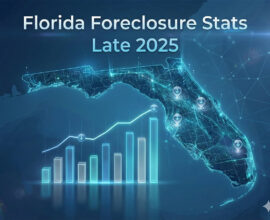Does the Roe v. Wade Abortion Ruling affect Real Estate?
Does the 2022 Abortion Ruling Affect Real Estate in Your Market
On June 24th, 2022, the Supreme Court of the United States (SCOTUS) overturned the infamous Roe v. Wade decision from 1973. Contrary to some beliefs, this ruling did not make abortions illegal in the United States and instead kicked the issue back to State Governments to decide how to deal with reproductive rights. While this decision has created somewhat of a commotion around politics, religion, ethics, and healthcare, the one topic that few people are talking about is how this decision will impact the real estate market.
There is always a possibility a political and legal move this big could have severe implications for real estate across the country. Even though the full effects of overturning Roe are yet to be seen by investors, some signs could help you prepare for what’s to come if anything is to come of it.
Will People Travel for Reproductive Healthcare?
Outside of new laws or trigger laws that went into effect after Dobbs v. Jackson’s Women’s Health Organization ruling overturned Roe, people were already crossing state lines to receive abortion care. From 2011 to 2020, the number of patients crossing state lines for pregnancy services grew from 6% to 9% (81,120 people in 2020 alone).
The rise of patients leaving home for medical care grew correspondingly with tighter restrictions in individual states. Between 2020 and 2021, 19 states enacted 106 new regulations regarding abortions, including 12 bans. Texas gained the most attention for its six-week abortion ban, but Arkansas, Oklahoma, Indiana, Montana, and South Dakota doubled down on laws limiting abortion access.
While policies and debates around abortion access were heating up, those looking for medical care were leaving town. A report by The Lancet Regional Health looked at abortion travel in 2017, just years before more strict laws were enacted around the country. Of the 8% who left their home states for abortion care:
- 74% left Wyoming
- 57% left South Carolina
- 56% left Missouri
- 13 states had fewer than 4% left
States with more restrictive laws averaged 12% of patients leaving. Fast forward to 2020, and the number of patients who left “hostile to abortion rights” states jumped from 9% to 15%. However, states with a middle ground or supporting policies only moved from 2% in 2011 to 3% in 2020.
This short-term migration of patients traveling for medical care didn’t have a noticeable impact on the real estate market. There may be some short-term rental properties and hotels/motels that saw a few extra guests if patients had to stay overnight but identifying those bookings due to healthcare would be nearly impossible.
It’s clear from early research that increasing restrictions around abortion care led to people leaving their states to obtain access to their desired medical care. The question becomes, “what happens when states can completely remove abortion access within their borders?”
Is There a Great Abortion Ruling Migration Coming?
Just moments after SCOTUS handed down its ruling regarding Dobbs, speculation began to circulate regarding something called “the Great Migration,” in which the nation became more geographically divided by political and social beliefs. When the White House Press Secretary, Katrine Jean-Pierre, was asked about this migration, she indicated that the outcome could lead to “nightmare scenarios.”
Some argue that the fear of some mass exodus is merely a way to stroke political fear, but evidence at least supports this claim as more than just hyperbole. According to a Redfin Survey, one in eight (12.5%) movers would only live somewhere abortion is entirely legal. In comparison, one in seven (15%) of movers refuse to live somewhere abortion is entirely legal.
On a less extreme note, 17% of respondents in the same survey said they prefer not to live where abortion is legal; 28% prefer to live where abortion is legal. Overall, 40% of survey takers had a favorable view of living where abortion is legal; 32% had an unfavorable view.

Redfin’s chief economist Daryl Fairweather believes that “homebuyers were migrating across state lines before those state lines had drastic repercussions. I believe that now movers are going to take the states laws in place more seriously. Affordability is always going to be the top concern for homebuyers, but I think moving from a place like Los Angeles to Austin will be a more difficult decision.”
The most significant piece of speculation regarding the housing market and the recent Roe decision suspects people may consider relocating from more conservative states to more liberal ones. It’s still a bit early to tell what kind of shift we may see in the housing market, but it is conceivable that people might start migrating to more like-minded states.
Tax attorney, real estate investor, and investing author Toby Mathis believes that states with abortion bans will see people leave. “Homebuyers already decide where to live based on state laws, especially when considering taxes. States with lower property, income, and sales tax often attract new residents. Unfortunately, finances still play a significant role in someone’s relocation ability. Not every liberal resident in Arkansas can afford to move to California, nor can every New Yorker handle a move to Texas”.
The Abortion Ruling is Affecting More Then Homebuyers
Homebuyers aren’t the only people considering relocating due to the current political climate. For starters, OB/GYNs in conservative states are rethinking their careers after Roe was overturned. These thoughts aren’t necessarily related to the moral or ethical side of abortion but the legal side.
Take Dr. Caitlin Bernard, the doctor in Indiana who provided the legal abortion for the ten-year-old Ohio rape victim. The state’s attorney general is now investigating this doctor. Even though Dr. Bernard followed state laws, she is now a target of the anti-abortion movement, even receiving death threats from the public. In an interview, Dr. Bernard said, “you know, this will affect our ability to care for miscarriages. This will affect our ability to take care of complications in early pregnancy that could kill someone. This will affect our ability to provide infertility treatment, contraception, the list goes on.”
Doctors who want to practice medicine based on their training and education may not want to face restrictions that may prohibit providing proper care. Others may not want to deal with social repercussions and threats from merely doing their jobs.
Some businesses may also feel the pressure to respond to political advancements. The last few years have shown cities in typically red states grow their tech hubs by attracting new companies and employees from the coasts. Cities like Austin and Salt Lake City are capitalizing on start-up-friendly laws/taxes and the ability to hire remote workers. Between 2018 and 2021, at least 113 California companies relocated to Texas. The aftermath of Roe could stop this momentum.
After Texas passed its six-week abortion ban, companies and workers spoke out. CEOs from Lyft, Uber, Yelp, and Bumble took public positions against the law. Companies like Salesforce announced they would help families relocate if they were concerned about reproductive care. Big tech companies like Tesla, Apple, etc., have been mostly quiet, but that could change. Jack Dorsey (CEO: Twitter) and Peter Grauer (CEO: Bloomberg) were calm for a while but eventually joined 200 other CEOs of major companies to sponsor a full-page New York Times ad that declared abortion bans are bad for business.
California is offering huge incentives for companies that move from states with abortion bans to the west coast. Phil Murphy, the Governor of New Jersey, has been writing letters to businesses telling them their state’s laws will negatively impact their ability to find, attract, and retain top female talent.
How Does Roe V Wade Impact the Real Estate Market?
While the great migration isn’t in full effect or guaranteed to happen just yet, it seems clear that people, workers, and companies are willing to relocate to be in more like-minded areas. When it comes to where people want to live and work, everything comes back to the housing market.
Commercial investors may end up in the most significant state of limbo over the coming years. The future of office real estate is already a bit unpredictable. The increase in remote work, a rise in interest rates, and a looming recession are already impacting the demand for office space. Oddly enough, the flux in office rentals isn’t universal; some markets are doing much better than others. Cities like Nashville, Atlanta, Austin, Salt Lake City, and Phoenix are seeing intense demands for office space, while other parts of the country are littered with empty commercial spaces.
For investors that deal with single/multi-family homes and apartments, the discussion around Roe’s impact on the market goes back to the oldest adage in property: location, location, location. How this court ruling affects your property depends highly on where it is located and in what kind of political environment it is.
As we approach the midterms, states are looking to either flip or confirm their controlling powers. Florida, for example, is on the worldwide stage. After Roe, the Florida state government passed a 15-week abortion ban. The ban was then temporarily halted before it was reinstated. It is currently unclear, especially with the Governor’s race heating up if Florida will ban abortions completely, loosen restrictions, or keep the current 15-week ban. Whether the outcome of the midterm elections will affect the 320,000+ people who move to the Sunshine State each year is anyone’s guess.
Of course, the balance of power in the Federal Government could quickly shift to one side or the other in just a few years. If the GOP takes control of both houses and the presidency, there’s a good chance they will seek a federal abortion ban. It’s impossible to know if this kind of outcome would cease the Great Migration or only add fuel to the fire.
Time Will Tell the post Roe V Wade Effects
While there is evidence that the decision to overturn Roe could lead to “The Great Migration,” it is too early to tell. There is some evidence that a portion of people is already moving to more harmonious areas, so allowing states to determine their own reproductive rights futures could turn this micro migration into a macro migration over time.
According to a 2021 study by the North American Moving Services, the most significant factors that contribute are the following:
- Cost of living
- Proximity to family
- Work-flexibility
Whether political affiliations, ideologies, or reproductive beliefs start to play a more significant role in where people want to live will take time to know. Real estate investors need only keep an eye on the political climate to see how families and companies react in their respective areas. If the current political climate continues to polarize the country, more people will likely seek refuge for their political and moral beliefs through relocation.
Only time will truly tell.








